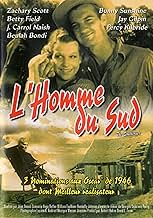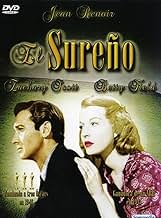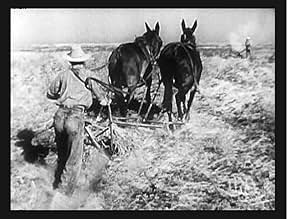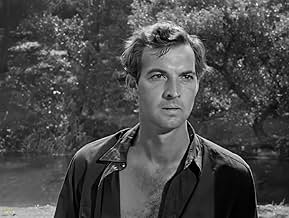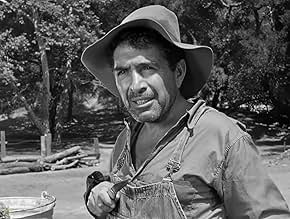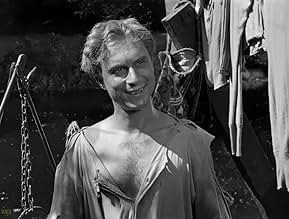AVALIAÇÃO DA IMDb
7,1/10
4,1 mil
SUA AVALIAÇÃO
Adicionar um enredo no seu idiomaThe life of the poor Tucker family who worked as cotton pluggers and decided to get their own ground, but nature was against them.The life of the poor Tucker family who worked as cotton pluggers and decided to get their own ground, but nature was against them.The life of the poor Tucker family who worked as cotton pluggers and decided to get their own ground, but nature was against them.
- Direção
- Roteiristas
- Artistas
- Indicado a 3 Oscars
- 3 vitórias e 3 indicações no total
Paul E. Burns
- Uncle Pete
- (as Paul Burns)
Audley Anderson
- Townsman
- (não creditado)
Rudy Bowman
- Townsman
- (não creditado)
Avaliações em destaque
An employee named Sam Tucker (Zachary Scott)frequently working for others is hired some land and he decides along with his family, -his wife (Betty Field), granny (Beulah Bondi)and two sons - attempt farming for themselves. The family finds hardships on their way and they'll have to fight against the elements,ills, poorness, distresses and a selfish neighbor (J. Carroll Naish) living with his daughter (Nash) and niece (Norman Lloyd) .
This is a rural drama about a survival fight amid all disgraces and terrible elements. It's a naturalistic drama splendidly played and magnificently staged. From the tale 'Hold Autumn in your hand' by George Sessions Perry and writing by William Faulkner though he appears uncredited. It's proceeded in similar style to ¨Grapes of wrath¨ by John Ford based on John Steinbeck novel . First rate performances by all star cast. Special mention to Belulah Bondi as sympathetic and and grumpy granny. And Norman Lloyd as roguish nephew, he's a veteran player still acting , who joined the original company of Orson Welles-John Houseman Mercury Theatre and after that he was hired to Hollywood to play as secondary actor in Alfred Hitchcock movie and other ones and made him an associate producer. Neo-realist and evocative cinematography by Lucien Andriot. Sensible and imaginative musical score by Werner Janssen.
The flick is excellently directed by Jean Renoir. He said about 'The Southerner' gave him more pleasure than any of his other Hollywood work. Renoir was voted the 12th greatest director of all time . Furthermore, Orson Welles frequently cited him as the greatest movie director of all time. He was son of the famous impressionist painter Auguste Renoir. After his French classics (Rules of game 1939, Human beast 38, La Marseillase 36, A day in the country 36, Boudu saved from drowning 32), he was brought to USA by American producers, directing awesome films in Hollywood (Woman on the beach 1947 , The diary of a chambermaid 46, The Southerner , The land is mine 43, Swamp water 1941). Later on, he returned to France , going on film-making classic movies (Elusive corporal 1962, Picnic on the grass 59, Testament of Dr Cordelier 59, Golden coach 52, The river 1951). Rating : Better than average, well worth watching.
This is a rural drama about a survival fight amid all disgraces and terrible elements. It's a naturalistic drama splendidly played and magnificently staged. From the tale 'Hold Autumn in your hand' by George Sessions Perry and writing by William Faulkner though he appears uncredited. It's proceeded in similar style to ¨Grapes of wrath¨ by John Ford based on John Steinbeck novel . First rate performances by all star cast. Special mention to Belulah Bondi as sympathetic and and grumpy granny. And Norman Lloyd as roguish nephew, he's a veteran player still acting , who joined the original company of Orson Welles-John Houseman Mercury Theatre and after that he was hired to Hollywood to play as secondary actor in Alfred Hitchcock movie and other ones and made him an associate producer. Neo-realist and evocative cinematography by Lucien Andriot. Sensible and imaginative musical score by Werner Janssen.
The flick is excellently directed by Jean Renoir. He said about 'The Southerner' gave him more pleasure than any of his other Hollywood work. Renoir was voted the 12th greatest director of all time . Furthermore, Orson Welles frequently cited him as the greatest movie director of all time. He was son of the famous impressionist painter Auguste Renoir. After his French classics (Rules of game 1939, Human beast 38, La Marseillase 36, A day in the country 36, Boudu saved from drowning 32), he was brought to USA by American producers, directing awesome films in Hollywood (Woman on the beach 1947 , The diary of a chambermaid 46, The Southerner , The land is mine 43, Swamp water 1941). Later on, he returned to France , going on film-making classic movies (Elusive corporal 1962, Picnic on the grass 59, Testament of Dr Cordelier 59, Golden coach 52, The river 1951). Rating : Better than average, well worth watching.
THE SOUTHERNER is notable for giving ZACHARY SCOTT his first real chance to shine as a promising new movie actor headed for stardom, teaming him with the always reliable BETTY FIELD as the wife of a dirt poor farmer in this Depression-era saga, uplifting despite the adversity of their situation due to Jean Renoir's fine direction.
"Grow your own crop," Scott, a Texas farmer, is told by his dying uncle. He struggles with his family to do just that--and THE SOUTHERNER becomes a tale of survival against the cruel twists and turns of nature. BEULAH BONDI is the stubborn Granny whose bark is worse than her bite, but she does tend to get annoying in her whining ways.
Working the land and making farmland self-supporting is never an easy matter and it gets plenty of negative treatment here with the odds against the struggling family at every turn. J. CARROLL NAISH and NORMAN LLOYD as hard-nosed neighbors make themselves utterly unlikeable (but believable) as Scott's uncooperative neighbors, unwilling to spare some milk for him when his son is ill. PERCY KILBRIDE comes to his rescue with a rented cow and later becomes his father-in-law, marrying BLANCHE YURKA.
But there are still hardships ahead, including a severe storm that destroys all the crops, serving to emphasize the man against nature theme of the entire story. Everything is destroyed but the human spirit.
Scott, Field and Bondi give heartfelt performances, with Bondi a bit over-the-top as Granny. It's not in the same class with THE GRAPES OF WRATH but it does create a sympathetic portrait of farmers who work the land.
Based on a novel called "Hold Autumn in Your Hand", it stands the test of time largely because of the performances.
"Grow your own crop," Scott, a Texas farmer, is told by his dying uncle. He struggles with his family to do just that--and THE SOUTHERNER becomes a tale of survival against the cruel twists and turns of nature. BEULAH BONDI is the stubborn Granny whose bark is worse than her bite, but she does tend to get annoying in her whining ways.
Working the land and making farmland self-supporting is never an easy matter and it gets plenty of negative treatment here with the odds against the struggling family at every turn. J. CARROLL NAISH and NORMAN LLOYD as hard-nosed neighbors make themselves utterly unlikeable (but believable) as Scott's uncooperative neighbors, unwilling to spare some milk for him when his son is ill. PERCY KILBRIDE comes to his rescue with a rented cow and later becomes his father-in-law, marrying BLANCHE YURKA.
But there are still hardships ahead, including a severe storm that destroys all the crops, serving to emphasize the man against nature theme of the entire story. Everything is destroyed but the human spirit.
Scott, Field and Bondi give heartfelt performances, with Bondi a bit over-the-top as Granny. It's not in the same class with THE GRAPES OF WRATH but it does create a sympathetic portrait of farmers who work the land.
Based on a novel called "Hold Autumn in Your Hand", it stands the test of time largely because of the performances.
"The Southerner" is a very good film starring Zachary Scott, Betty Field, Beulah Bondi, Norman Lloyd, J. Carrol Naish, and Blanche Yurka. It's the story of a man, Sam Tucker, working as a cotton picker along with his wife and parents. As his father lays dying in the field, he tells his son to own his own land. Sam quits his job and makes arrangements to work the land of his former boss, with the goal of ownership. He's not welcome by his closest neighbor (Naish) and the house on the land is nothing but a shack. The family nearly starves during the winter; the daughter can't go to school because she doesn't have a coat; his son falls ill with "spring sickness" (probably rickets). Nevertheless, Sam and Nona (Field) keep working, Sam knowing that working the land and feeling the sun is the only way he can live.
This is a very absorbing film. You not only see, but feel the struggles of the family and how hard they work no matter the odds, with strength and determination.
Betty Field was a good choice as Nona - she's plain and tired-looking, with a bright smile. The devotion she has to Sam and he to her is very touching. As a couple, she and Scott are very effective. Beulah Bondi is very good as the irascible, annoying, wizened grandmother either complaining or predicting doom and gloom. Naish gives an excellent performance as a jealous and unhelpful neighbor, and Norman Lloyd is appropriately slimy as his worker. It's always hard to relate the skinny Lloyd, who usually played villains, with the older, revered Dr. Auschlander in "St. Elsewhere" - he's had quite a career. As of this writing, he's 93 and still working.
Zachary Scott is okay as Sam but it's not a comfortable fit. The part required more warmth, more depth, and more internal grit; it's a Henry Fonda role. Still, for not being Scott's normal type of sophisticated or villainous part, he handles it well.
A good film, beautifully directed by Jean Renoir, who was nominated for an Oscar. There are some stunning cinematic moments as well. Worth watching for sure.
This is a very absorbing film. You not only see, but feel the struggles of the family and how hard they work no matter the odds, with strength and determination.
Betty Field was a good choice as Nona - she's plain and tired-looking, with a bright smile. The devotion she has to Sam and he to her is very touching. As a couple, she and Scott are very effective. Beulah Bondi is very good as the irascible, annoying, wizened grandmother either complaining or predicting doom and gloom. Naish gives an excellent performance as a jealous and unhelpful neighbor, and Norman Lloyd is appropriately slimy as his worker. It's always hard to relate the skinny Lloyd, who usually played villains, with the older, revered Dr. Auschlander in "St. Elsewhere" - he's had quite a career. As of this writing, he's 93 and still working.
Zachary Scott is okay as Sam but it's not a comfortable fit. The part required more warmth, more depth, and more internal grit; it's a Henry Fonda role. Still, for not being Scott's normal type of sophisticated or villainous part, he handles it well.
A good film, beautifully directed by Jean Renoir, who was nominated for an Oscar. There are some stunning cinematic moments as well. Worth watching for sure.
I saw this film on a Saturday morning and loved it. It's about a man, his wife, their two children and the grouchy grandma, who are dirt poor (and I mean that literally) farmers. It's based on the book by George Sessions Perry called "Hold Autumn in Your Hand," but the movie and the book are completely different in style and manner. I personally like the movie more, as it showed the family's togetherness much better than the book. A wonderful Renoir film (I think my favourite of all his) and definitely a must see. The courage of the family is really touching. I gave it a...10/10.
The opening shot amounts to a wonderfully compelling hymnal to the land and those who toil there, while the rest of the movie attempts to follow through with that noble theme. There's no doubt that this is one of the most laudable movie projects to come out of the decade. But for all the earnest concern, there's still too much of the theatrical for my liking. I know, the film is generally hailed by critics, and there's much to be said for its consistent down-and-dirty look at the plight of the southern share-cropper. But there's also a staginess to many of the characters and scenes that blemishes director Renoir's naturalistic approach.
Consider Beulah Bondi's over-the-top turn as Granny. She's supposed to offer amusingly caustic comments on events as relief from the rigors of the plot. The trouble is that both she and the camera rub our nose in the role. They just as well have hung a sign around her neck saying "crusty old woman". The bad make-up job doesn't help either and serves as a constant reminder that the Tuckers are after all only a make-believe family. Since she's a central character, the flaws in her wild eye-rolling performance are hard to ignore.
The other acting is fine, especially from Scott in the lead role as Sam. However, both he and wife Nona (Field) are more stereotypes than multi-dimensional people. He's the noble, tireless worker, and so is she. Together, they are unwavering in their support of each other and the farm. And when Sam does waver after the flood, it's Nona providing the strength to persevere. Thus, it's the whole family and not just Sam plowing the field that will make the farm a success. That's a good point for the script to make. The trouble is that Sam and Nona are simply too good to be believable in the face of all the adversity. At least one breakdown scene where the emotional toll of the wrenching burdens is expressed would have added a more human dimension. Writer Renoir is simply too insistent on the nobility of the two characters, turning them more into symbols than complex real people.
On the other hand, the hostile neighbor Devers (Naish) is the most interesting of the characters. His dark resentful nature would appear to come from uncredited co-writer William Faulkner who specialized in such Gothic personalities. The real agonizing story of what it means to start up a farm is told by the embittered old man in what I take to be the movie's central scene. He's made a success, but that success has made him hard and mean, and now he lives in fear of anyone rising above him. I wish the screenplay had not betrayed that dark impact for the price of a big fish in what strikes me as a very implausible turn- around scene on the riverbank.
The film's virtues are pretty obvious. There's a real effort at showing rural poverty and its effects on people, never a Hollywood biggie. When little Daisy lovingly puts on the crude blanket-coat, I was reminded of a world so easily passed over in a nation of commercialized malls. Ditto the well-done possum feast, where the simple act of eating means so much more. And especially when the family and we gather around the little hearth fire to peer into the glow through eyes much more ancient than our own. These are indelible scenes that transcend the movie screen and alone are worth the price of the movie.
Maybe it took a European auteur outside the usual studio framework to want to deal as honestly as possible with such a non-commercial theme. But the location shooting and insistence on the unglamorous, even down to the very unHollywood barfly, add up to what looks like an effort at honest depiction. Of course, Renoir's well-known humanism and rollicking humor show up in the party scene in what amounts to a folk celebration of life and community. Then too, there's that telling scene between Sam and Tim (Kemper) where each comes to appreciate the contributions of the other in supplying the community's needs. Whatever the film's regrettable flaws, the message remains a powerful one that needs constant retelling, especially in our own cynical times. Too bad Renoir didn't stay on this side of the Atlantic. His influence on our own movie-makers would have pushed them in a much needed direction.
Consider Beulah Bondi's over-the-top turn as Granny. She's supposed to offer amusingly caustic comments on events as relief from the rigors of the plot. The trouble is that both she and the camera rub our nose in the role. They just as well have hung a sign around her neck saying "crusty old woman". The bad make-up job doesn't help either and serves as a constant reminder that the Tuckers are after all only a make-believe family. Since she's a central character, the flaws in her wild eye-rolling performance are hard to ignore.
The other acting is fine, especially from Scott in the lead role as Sam. However, both he and wife Nona (Field) are more stereotypes than multi-dimensional people. He's the noble, tireless worker, and so is she. Together, they are unwavering in their support of each other and the farm. And when Sam does waver after the flood, it's Nona providing the strength to persevere. Thus, it's the whole family and not just Sam plowing the field that will make the farm a success. That's a good point for the script to make. The trouble is that Sam and Nona are simply too good to be believable in the face of all the adversity. At least one breakdown scene where the emotional toll of the wrenching burdens is expressed would have added a more human dimension. Writer Renoir is simply too insistent on the nobility of the two characters, turning them more into symbols than complex real people.
On the other hand, the hostile neighbor Devers (Naish) is the most interesting of the characters. His dark resentful nature would appear to come from uncredited co-writer William Faulkner who specialized in such Gothic personalities. The real agonizing story of what it means to start up a farm is told by the embittered old man in what I take to be the movie's central scene. He's made a success, but that success has made him hard and mean, and now he lives in fear of anyone rising above him. I wish the screenplay had not betrayed that dark impact for the price of a big fish in what strikes me as a very implausible turn- around scene on the riverbank.
The film's virtues are pretty obvious. There's a real effort at showing rural poverty and its effects on people, never a Hollywood biggie. When little Daisy lovingly puts on the crude blanket-coat, I was reminded of a world so easily passed over in a nation of commercialized malls. Ditto the well-done possum feast, where the simple act of eating means so much more. And especially when the family and we gather around the little hearth fire to peer into the glow through eyes much more ancient than our own. These are indelible scenes that transcend the movie screen and alone are worth the price of the movie.
Maybe it took a European auteur outside the usual studio framework to want to deal as honestly as possible with such a non-commercial theme. But the location shooting and insistence on the unglamorous, even down to the very unHollywood barfly, add up to what looks like an effort at honest depiction. Of course, Renoir's well-known humanism and rollicking humor show up in the party scene in what amounts to a folk celebration of life and community. Then too, there's that telling scene between Sam and Tim (Kemper) where each comes to appreciate the contributions of the other in supplying the community's needs. Whatever the film's regrettable flaws, the message remains a powerful one that needs constant retelling, especially in our own cynical times. Too bad Renoir didn't stay on this side of the Atlantic. His influence on our own movie-makers would have pushed them in a much needed direction.
Você sabia?
- CuriosidadesBased on the novel "Hold Autumn in your Hand", by George Sessions Perry, which won the first National Book Award in 1941.
- Erros de gravaçãoWhen Finley whipped the cows the dog disappeared for a second Indicating a film cut.
- ConexõesEdited into 365 days, also known as a Year (2019)
Principais escolhas
Faça login para avaliar e ver a lista de recomendações personalizadas
- How long is The Southerner?Fornecido pela Alexa
Detalhes
Bilheteria
- Orçamento
- US$ 750.000 (estimativa)
- Tempo de duração
- 1 h 32 min(92 min)
- Cor
- Proporção
- 1.37 : 1
Contribua para esta página
Sugerir uma alteração ou adicionar conteúdo ausente



